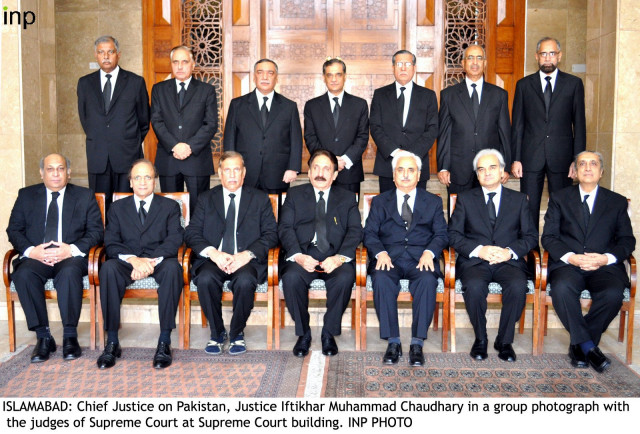SC’s campaign against corruption
The Supreme Court of Pakistan under Iftikhar Chaudhry has regained much of its lost prestige.

The chief justice was of the opinion that “non-completion of these projects was due to deliberate negligence, which was driven by hidden motives and was badly hurting the public exchequer”, adding that the court would now send such cases of negligence to the NAB (sic!). His list of plaints also included non-compliance on the part of officers whose removal the Court had advised but who had actually been promoted to even better positions while “officers who were working properly and dutifully are being transferred to Gilgit-Baltistan”.
Iftikhar Chaudhry was on the bench hearing two petitions — by political opponents of the government of one shade or another, one a serving minister in the cabinet — about corruption allegedly behind delays in the inauguration of two RPPs. At one point he also conceded that the Court was not fully decided about the extent of powers it had to intervene in the matter of the appointment of the NAB chief, but he felt surer about the RPPs on the basis of the petitions before the Court and stated that the “court would take expert opinion from relevant quarters and then send the cases to NAB”. His determination to arrest the unending march of corruption was firm as he ignored pleas from the government’s defence that at least one petitioner who was in the cabinet should have resigned before appearing in the court against the government.
The Supreme Court of Pakistan under Iftikhar Chaudhry has regained much of its lost prestige. It is considered the first ‘independent’ apex court that has not only taken on the brute power of the executive but has become ‘activist’ in the pursuit of executive malfunctions. A broad range of public opinion backs this activism while ‘lawyer power’ stands behind it as its expression of street clout. What one cannot ignore is also the opposition to the PPP-led government whose motives are clearly more political than moral, further backed by a section of Pakistan’s powerful media where some journalists are more overtly anti-PPP than justified by their profession. The apex court and the authority of the chief justice has not gone without challenge by the Supreme Court Bar Association, whose leaders, it must be admitted, have not always been of high professional quality in the past.
The appearance of judicial bias is implied in some political commentaries where the incumbent government is often seen as besieged by elements hard at work to topple it from power by hook or by crook. Any state in the world faced with a seriously curtailed writ, terrorism, resultant intimidation and economic collapse would be faced with dysfunction. This is proved in the provinces where no government has shown even tolerable performance.
Quite wrongly, the perception is that the powers that are out to get the government will lean on the anti-executive mood of the Supreme Court to accomplish their mission to take Pakistan back to the 1990s when governments were toppled while the Court selectively supported their dismissal. It must be said today that the present Court in its suo motu methodology can also be perceived by some to be partisan, given the background of the facts of its restoration. In the past, the ‘expert’ advice rendered to the Court may not have led to good results, as in the case of the Steel Mills and the sugar crisis, both causing more losses to the state than preventing them. The crisis of trespass into the domain of the executive could be faced by any ‘activist’ Court in the world.
Published in The Express Tribune, October 28th, 2011.















COMMENTS
Comments are moderated and generally will be posted if they are on-topic and not abusive.
For more information, please see our Comments FAQ